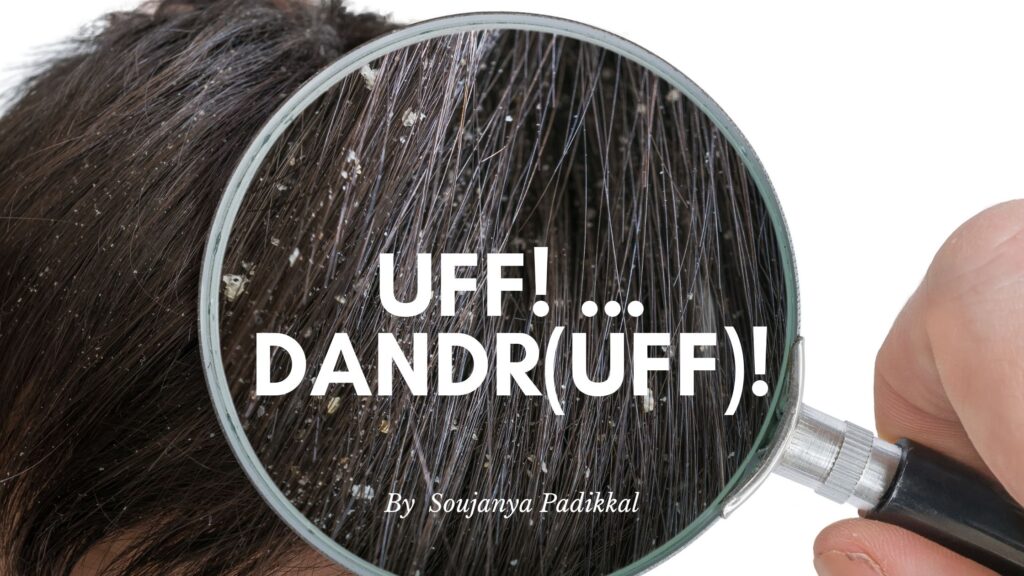Health & Wellness
UFF! …DANDR(UFF)!
By Soujanya Padikkal
As I comb my hair, to my dismay I notice the white flakes that have fallen on my clothes. Dandruff! Dandruff! Dandruff! I can’t seem to get a break with it. But what is it, why does it occur and despite being so omnipresent, why isn’t there still a magic product to cure it permanently?
Those white flakes that you notice on your hair at one point in your lifetime are dead skin cells that shed off the scalp, and is commonly referred to as “Dandruff”. Dandruff is a scalp disorder which is characterized by excessive shedding of skin cells from the scalp. It is a common problem faced by people of all age groups. Skin cells in the scalp continuously renew themselves. In this process, the old or dead cells are pushed outward where they eventually die and flake off. For most individuals, these flakes of skin are too small to be visible. However, certain conditions cause cell turnover to be unusually rapid. The result is that, there is a build-up of the dead skin cells, which cluster and shed in large clumps as the flakes visible to us. In traditional Ayurveda, this condition is termed as ‘Darunak’ and is grouped under Kshudra rogas, i.e. diseases that can be cured easily.
Symptoms of dandruff
- Itchy scalp
- White scales (flakes) like structures
- Dryness of the scalp or oily-looking flakes
We have based on our understanding, classified dandruff under the following broad heads:
- Dry dandruff: this dandruff is caused due to dry skin related issues. Dry skin could be due to both internal (inherent to the body) and external reasons. This dandruff is dry and flaky. Typically, individuals with dry, curly hair suffer from this dandruff.
- Oily dandruff: Oily dandruff occurs due to accumulation of sebum oil on the scalp. Sebum is an oily substance produced by the sebaceous glands of our body. The scalp has an abundance of hair follicles and these glands producing sebum. Sebum oil can accumulate and cause the dead skin cells and dirt to form clumps and itchy flakes. Sebum also provides an ideal environment for fungi to grow. Malassezia is a fungus that is a part of our normal scalp flora. Itfeeds on the sebum and produces oleic acid as a by-product that that in turn causes skin cells to clump together causing white flakes.
- Disease induced dandruff: Few skin disease/conditions like seborrheic dermatitis, eczema, psoriasis, cause skin to flake and thus such dandruff is referred to as disease induced. The cause of such dandruff is the underlying medical condition. Seborrheic dermatitis induces oily dandruff while eczema and psoriasis could induce dry dandruff. Seborrheic dermatitis, eczema, psoriasis etc are medical conditions and need to be diagnosed by doctors.
Causes of dandruff
To understand the line of treatment of this disorder, we need to understand the factors that cause dandruff. For ease of and better understanding, in this article, the factors responsible for causing dandruff have been divided into internal and external factors .
| INTERNAL FACTORS | EXTERNAL FACTORS |
| Age and Hormonal imbalance | Water quality |
| Diet | Chemical based hair products |
| Stress | Weather conditions |
| Medical conditions | Pollution |
Internal factors include, age and hormonal imbalance, diet, stress and medical conditions.
- Age and Hormonal imbalance –Hormones play a key role in oil production. Hormonal imbalance can lead to either excess sebum production or skin dryness ultimately resulting in dandruff. It is observed more during our adolescent years and midlife. “Cradle cap” is a baby form of dandruff seen in new born babies and infants. It is said to be caused due to over production of sebum oil.
- Diet – Vitamin B 12, Vitamin E, Zinc and omega 3 fatty acids are important nutrients that stimulate blood flow to the scalp. Studies have shown that people with insufficient amount of these nutrients are prone to dandruff. As per Ayurveda, unhealthy diet results in imbalance of the doshas which can also trigger dandruff.
- Stress –Stress influences hormone levels, lowers immune defenses levels which can trigger sebum production, proliferation of fungi which thrives on sebum and ultimately leading to dandruff.
- Medical conditions – as mentioned earlier, some medical conditions like seborrheic dermatitis, eczema or psoriasis can induce dandruff.
External factors include use of chemical based hair care products, weather conditions and pollution
- Water quality – Hard water when used for washing hair can dry the scalp and also cause buildup of calcium and salts on hair and scalp. Hot water also dried the scalp. All these factors can inturn cause dandruff.
- Hair care products – Chemical based hair care products can adversely impact the health of the scalp and cause dandruff. For instance mineral oil or petroleum based hair oils, hair waxes, styling gels, hair conditioners etc form a layer and result in buildup on the scalp which inturn causes dandruff. Similarly sulphates based shampoos, chemical hair dyes, alcohol based hair gels/sprays, etc being harsh, strip the hair and scalp of its natural oils causing excessive dryness and resultant dandruff.
- Weather Conditions- Dry weather conditions remove the moisture content from the skin which can result in dry dandruff. Exposing the hair to direct sunlight can also be damaging to the scalp and can trigger dandruff. Similarly, sebum production can increase in humid weather conditions which also can result in oily dandruff.
- Pollution – There is no doubt that pollution has adverse effects on hair. Some experts believe pollution increases the sensitivity of scalp, leading to itching and dandruff.
How to treat dandruff?
It is important to understand both the type and root cause of dandruff to address it rightly. Various factors can cause different types of dandruff. Thus, there cannot be one standard product or method to treat all types of dandruff.
Dandruff can be annoying and embarrassing. However, a simple, natural and sustainable hair care routine can help in managing the condition effectively.
- Dandruff caused by internal reasons like hormonal imbalance, stress or diet can be managed by making changes in lifestyle and diet.
- Diseases induced dandruff require medical intervention. It is advisable to consult a doctor, if the dandruff problem persists even after making necessary lifestyle/diet changes and adopting right & natural hair care products, as it could be an indication of a medical condition.
- Washing hair with soft/drinking lukewarm water can prevent dandruff triggers like salt and calcium buildup and drying of scalp.
- Using natural hair care products like cleansers, oils, conditioners, colours etc which do not leave buildup on hair/scalp and which are not harsh to strip off the natural hair oil, can help in preventing dandruff.
- Cover your hair when stepping out to avoid exposing hair to extreme weather conditions and pollution.
- People suffering from oily dandruff should avoid applying excess hair oil and should wash their hair atleast 2-3 times a week with natural hair cleansers
- People suffering from dry dandruff should regularly oil their hair before shampoo, and use natural hair cleansers.
As always, we wish to emphasize that external products can help in treating/curing dandruff only to the extent the cause is external.
Disclaimer: The author is not a medical expert. Please consult a doctor if you have a severe and stubborn dandruff condition.

